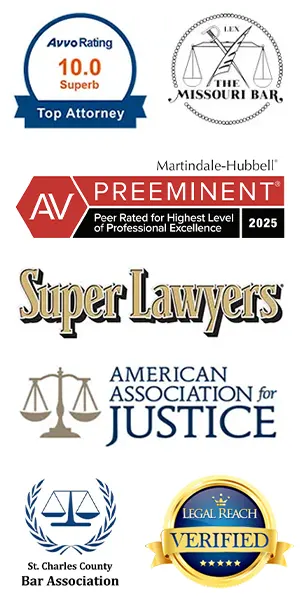Experienced Trial Lawyers
More Than 100 Years Of Combined Experience On Your Side

Suing Government Agencies or Employees in Missouri and the 90-Day Tort Claims Law

The Missouri Tort Claims Act: A Limited Waiver
A legal doctrine known as “sovereign immunity” has always shielded the government from lawsuits without its approval. This concept, rooted in English common law, has evolved over time in the United States.
In Missouri, the state government and its entities generally enjoy sovereign immunity, but there are important exceptions. The Missouri Tort Claims Act serves as a limited waiver of sovereign immunity, allowing citizens to file lawsuits against the state under specific circumstances. This act strikes a balance between protecting citizens’ rights and maintaining the government’s ability to function without constant legal challenges.
Key Exceptions to Sovereign Immunity
There are several exceptions to the sovereign immunity doctrine in Missouri, as outlined in the Missouri Tort Claims Act. The main exceptions include:
- Motor vehicle accidents: When a public employee, acting within the scope of their employment, negligently causes a motor vehicle accident, the victim may bring legal action against them.
- Dangerous property conditions: If someone is injured due to a dangerous condition on government property, that injured party may seek compensation from the government. To qualify under this exception, the injured party must prove that:
- A dangerous condition existed on the property at the time of the injury.
- The dangerous condition created a reasonably foreseeable risk of harm.
- A public entity negligently created the condition or failed to remedy it despite having notice of the danger.
- The dangerous condition caused the injury.
- Applicable insurance: In situations where the government entity has applicable insurance for the claim, they may expressly waive immunity up to insurance limits.
These exceptions are subject to interpretation by the courts, and the application of sovereign immunity can be complex. Recent case law continues to shape the understanding of these exceptions, making it crucial to consult with an attorney who stays current on legal developments in this area.
Challenges in Government Liability Cases
Suing a government entity presents unique challenges:
- Strict deadlines: The 90-day notice requirement is just the beginning. There are other time-sensitive aspects along the process, which is why it’s valuable to get a lawyer’s guidance.
- Complex procedures: Government liability cases often involve specialized procedures and rules.
- Limited liability: The caps on damages can make it difficult to recover full compensation for severe injuries.
The 90-Day Notice Requirement: A Critical Deadline
One of the most crucial aspects of the MTCA is the 90-day notice requirement. This provision mandates that anyone intending to sue a government entity in Missouri must provide written notice of their claim within 90 days of the injury. This short timeframe serves several purposes:
- It allows the government to investigate claims promptly.
- It helps preserve evidence.
- It gives the government an opportunity to settle claims before they escalate to lawsuits.
Failure to comply with this deadline can result in the loss of the right to sue, making it imperative for injured parties to act quickly
The Process for Filing a Claim Against the Government in Missouri
To initiate a claim against a government entity in Missouri, follow these steps:
- Gather information: Collect all relevant details about the incident, including date, time, location, and any witnesses.
- Draft the notice: Prepare a written notice that includes:
- Your name and address
- A description of the incident
- The injuries you sustained
- The compensation you seek.
- Submit the notice: File the notice with the appropriate government agency. For claims against the City of St. Louis, for example, contact the City Counselor’s office.
- Wait for response: The government will investigate the claim and may offer a settlement or deny liability.
- Consider legal action: If the claim is denied or inadequately settled, consult with an attorney about filing a lawsuit.
Compensation Limits Under the MTCA
The compensation limits imposed by the Missouri Tort Claims Act significantly impact the potential recovery in lawsuits against government entities. These limits are as follows:
- $2 million for all claims arising from a single incident
- $300,000 per person injured in a single incident.
These caps apply no matter how severe the injuries or the losses incurred. This means that even if your injuries and losses exceed these amounts, your recovery will be limited to the statutory maximum.
The impact of these limits can be substantial, especially in cases involving severe injuries, long-term disabilities, or wrongful death. For instance, if you suffer catastrophic injuries that result in medical bills and lost wages far exceeding $300,000, you would still be limited to that amount in your recovery from the government entity.
Additionally, these limits apply to the total recovery, including both economic damages (such as medical expenses and lost wages) and non-economic damages (like pain and suffering). This can make it challenging to fully compensate individuals who have suffered significant non-economic losses.
Given these limitations, it’s crucial to work with experienced attorneys who can:
- Accurately assess the full value of your claim
- Identify all potential sources of compensation, including any non-governmental parties who may share liability
- Negotiate effectively to maximize your recovery within the statutory limits
- Explore alternative compensation strategies, such as structured settlements, that might provide better long-term benefits within the confines of the law.
Understanding these limits is essential for managing expectations and developing appropriate legal strategies in government liability cases.
Why Legal Representation Is Crucial When Filing a Claim Against Government Entities
Given the complexities of government liability cases, seeking legal representation is crucial. Experienced attorneys can:
- Ensure compliance with all deadlines and procedural requirements
- Gather and preserve essential evidence
- Navigate the intricacies of the MTCA
- Negotiate effectively with government entities
- Maximize compensation within the legal limits.
Preparing for a Government Liability Case
If you believe you have a claim against a government entity in Missouri:
- Document everything: Keep detailed records of the incident, your injuries, and any related expenses.
- Seek medical attention: Ensure all injuries are properly diagnosed and treated.
- Act quickly: Remember the 90-day deadline and consult with an attorney as soon as possible.
- Preserve evidence: Collect and safeguard any physical evidence or witness information.
How Filing a Claim Against a Government Entity Differs From Claiming Against a Private Party
Filing a claim against a government entity in Missouri differs significantly from filing a claim against a private party in several key ways:
- Notice requirement: The most crucial difference is the 90-day notice requirement. Unlike private party claims where you typically have years to file a lawsuit, claims against the government must be initiated with a formal notice within 90 days of the injury.
- Sovereign immunity: Government entities are protected by sovereign immunity, which limits the types of claims that can be brought against them. You must ensure your claim falls within one of the exceptions to sovereign immunity.
- Procedural complexities: Government liability cases often involve more complex procedures and rules. For example, you may need to file your claim with specific government offices or follow particular formatting requirements for your notice.
- Compensation limits: As discussed earlier, there are strict caps on the amount of compensation you can recover from a government entity, which don’t apply in most private party cases.
- Limited discovery: In some cases, the discovery process (gathering evidence) may be more limited when dealing with government entities due to confidentiality and security concerns.
- Different standards of care: The standard of care expected from government entities in maintaining public property may differ from that expected of private property owners.
- Political considerations: Lawsuits against government entities can sometimes involve political sensitivities that aren’t present in private party cases.
- Jury perceptions: If a case goes to trial, juries may view government entities differently than private parties, which can affect the outcome.
- Settlement processes: Government entities often have specific procedures and approvals required for settling claims, which can make the settlement process more complex and time-consuming.
Given these differences, it’s crucial to work with attorneys who have specific experience in government liability cases. They can navigate these unique challenges and help ensure your claim is handled properly from start to finish
Injured in an Accident Involving a Missouri Government Employee or Entity? Contact Shea Kohl Law Today.
Suing government agencies or employees in Missouri requires a thorough understanding of the Missouri Tort Claims Act and strict adherence to its requirements, particularly the 90-day notice rule. While the process can be challenging, it’s not impossible with the right legal guidance.
At Shea Kohl Law, we understand the nuances of government liability cases in Missouri. Our experienced attorneys can guide you through the complex process of filing a claim against a government entity, ensuring compliance with all legal requirements and deadlines. With over 100 years of combined legal experience, our team is well-equipped to handle even the most challenging government liability cases.
If you believe you have a claim against a government entity in Missouri, don’t hesitate to seek professional legal advice. Contact Shea Kohl Law, LC at (636) 946-9999 for a free consultation on your case.
Call SK Law at (636) 946-9999
or contact us online to schedule your initial consultation.
Use of this Website does not create an attorney-client relationship. The choice of a lawyer is an important decision and should not be based solely upon advertisements. Any and all pictorial representations, people and or situations contained on this page or any other page in this website are simulations for purposes of advertising and for this site and are not actual clients or situations.
SK Law serves clients in Missouri including St. Charles, Troy and Lincoln and throughout Warren and St. Louis counties. We also serve clients in Illinois.


